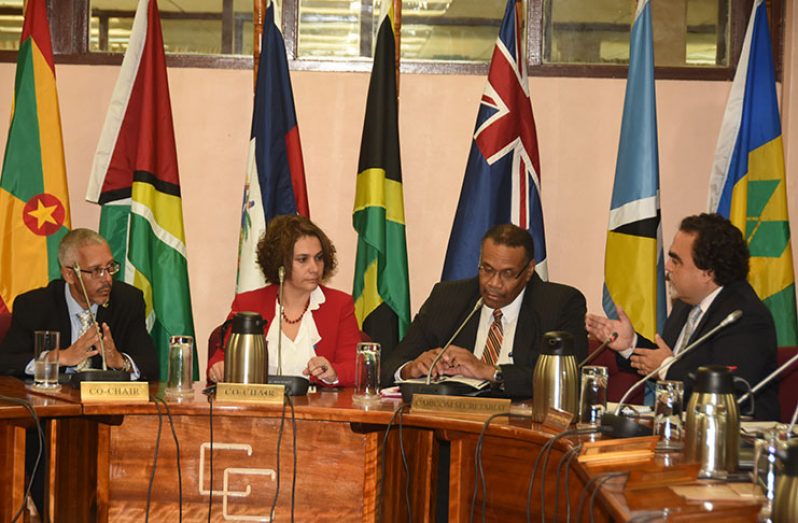MEMBER states of the Caribbean Community (CARICOM) are once again tapping into the valued experiences gained by the Republic of Chile, with the aim of building capacity in the areas of trade policy and trade promotion.
On Wednesday, a regional seminar opened here in Guyana at the CARICOM Secretariat attracting 13 member states: Antigua, The Bahamas, Barbados, Belize, Dominica, Grenada, Guyana, Jamaica, St. Kitts and Nevis, St. Lucia, St. Vincent, Suriname and Trinidad.
The Chilean delegation is being led by Chile’s Ambassador to Guyana, Claudio Rojas and head of Chile’s North America, Central and Caribbean Department, Carla Henriquez.
During the opening ceremony which took place in the presence of Guyana’s Business Minister, Dominic Gaskin, the Chilean Ambassador explained that the Chilean delegation is made up of professionals and experts in the field of trade, many of whom play active roles in the negotiations undertaken by Chile with other countries.
“This seminar – and the work ahead – will be an opportunity for [the exchange of views and experience, networking and most probably the very first step of many others to come in the context of Chile’s relationship and its promotion with Caribbean countries, in the field of cooperation and on fostering economic, trade, investment and political and cultural ties,” Ambassador Rojas explained.
He said Chile, like Guyana, had experienced many challenges in years it sought to capitalise only on traditional crops. Additionally, he recalled that the country had limited application and use of technology for its production.
“As Chile was puzzle[d] to deal with this limitation of the past, we start a new approach in a sustained manner with the strong commitment of the public sector in launching several instruments for the transformation of agriculture – as a sector – and Chile´s economic as a whole, that is, sound macro-economic policies,” he explained.
Ambassador Rojas said Chile had also established a clear regulatory framework, while working with other countries in seeking an open and fair international trade system.
TACKLING BOTTLENECKS
It was noted that the policies established by Chile were aimed at tackling many of the bottlenecks including: a lack of commercial-sized farms dedicated to non-traditional crops, limited financing for new projects, outdated farming methods, and a disconnection between international buyers and local producers, international market access difficulties, lack of a public policy design to interact globally, and to understand the complexity of trade.
“Chile has been able to attained those challenges and work on resolving the problems that we have been confront[ed] with, and also to find solutions to new ones, in a permanent and consistent manner, approach takes the importance – in its full sense – the concept of ‘Economic (Trade and Investment ) Diplomacy,’” he posited.
Chile, he said, stands ready and willing to share with CARICOM member states its experiences, noting that the forum forms part of a model of horizontal cooperation.
“Chile is a small nation and therefore the multilateral framework recognises the role and contribution of developing countries in being constructive on perusing on building bridges for the promotion and understating among nations, and for the well-being of our people. At the regional level, Chile has brought its commitment to the Pacific Alliance, understood not as an ideological-political entity, but as a scheme of integration, promotion of trade, movement of goods, people and capita,” he further explained.
MUCH TO LEARN
Minister Gaskin said CARICOM member states have much to learn from Chile. He explained that while there is a wealth of experience around the world in the area of trade, there is a great disparity in the quality of those experiences, as such, Guyana and the region at large, is pleased to tap into the experiences of successful countries like Chile.
Minister Gaskin noted that while the private sector is a key player in the field of trade, it is the public sector that facilitates and guides it.
“We know that Chile is considered [as] one of Latin America’s success stories and most experts would tell you that that success is built on sound policies and strong regulatory framework that emphasise openness, transparency and predictability in the areas of trade.”
As such, he said it is important to create an attractive business environment that is built on best-practices.
Meanwhile, CARICOM’s Assistant Secretary-General in the area of Trade and Economic Integration, Joseph Cox, explained that Chile has been assisting CARICOM in the areas of agriculture, Spanish language training, diplomatic courses, trade, natural disaster management and South-South Co-operation, through its Chilean International Cooperation Agency (AGCI).
It was noted that some 400 teachers have benefited from the Spanish training.
Pointing to the AGCI’s 2015-2018 Development Programme, which is being funded to the tune of US$12M, the Assistant Secretary-General disclosed that for 2017, the CARICOM Secretariat has submitted five project proposals for consideration.
The regional seminar is in response to discussion and agreement reached in 2016 by President Michelle Bachelet with the then Chairman of CARICOM, Prime Minister of Dominica, Roosevelt Skerrit.
A similar agreement was reached with President Granger in his capacity as Chairman of CARICOM.



.jpg)








